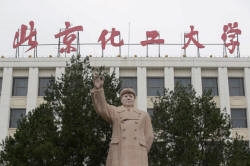|
 Exclusive:
Australia's two biggest cities cancel Mao Zedong
concerts, citing safety concerns Exclusive:
Australia's two biggest cities cancel Mao Zedong
concerts, citing safety concerns
 Send a link to a friend
Send a link to a friend
[September 01, 2016]
By Byron Kaye
SYDNEY (Reuters) -
Australia's two biggest cities Sydney and Melbourne
canceled concerts commemorating the death of former
Chinese communist leader Mao Zedong, with one citing
safety concerns, after Chinese Australians complained
the content was insensitive.
|
|
 The incident signifies the continued divisiveness of Mao
among Chinese, both at home and abroad, four decades after his
death. The incident signifies the continued divisiveness of Mao
among Chinese, both at home and abroad, four decades after his
death.
In China there is a quiet resurgence in popularity toward Mao,
with his image adorning banknotes and his embalmed body
attracting hundreds, if not thousands, of visitors a day to
Beijing. But there is also continued criticism among Chinese of
his reign, under which tens of millions died.
For weeks, Chinese in Sydney and Melbourne complained that the
"Glory and Dream" concerts, scheduled for September in both
cities' town halls, lionize a leader they see as responsible for
millions of deaths.
On Thursday, a spokesperson for the City of Sydney said in an
email that after consulting police, the council had "concerns
regarding the potential for civil disturbance, patron-to-patron
conflict and staff-to-patron conflict" and canceled the event.

The spokesperson said the concert organizers, who booked the
venue and arranged the concerts without council involvement, had
also determined that the event was "at high risk of disruption
and elevated risk to personal safety".
A spokeswoman for City of Melbourne said the concert was also
canceled in that city, but declined to give a reason saying it
was the decision of the organizers.
An organizer of the events, Sydney property developer Peter Zhu,
said in a telephone call that he was only the "sponsor" and
declined to comment further. The other organizer, a group called
the International Cultural Exchange Association, did not respond
to emails and calls.
[to top of second column] |

Mao, who died in 1976, remains a polarizing figure in China.
While the ruling Communist Party has acknowledged Mao made mistakes,
there has yet to be an official accounting for the chaos of the
Cultural Revolution or the millions of deaths from starvation during
the 1958-61 Great Leap Forward.
But he has also become a potent symbol for leftists within the
Communist Party who feel that three decades of market-based reform
have gone too far, creating social inequalities like a yawning
rich-poor gap and pervasive corruption.
The divisions over Mao are especially pronounced in Australia, home
to one of China's biggest offshore communities, where more than a
million of the country's 24 million population are either
Chinese-born or identify as having Chinese heritage.
In Australia, an online petition calling for the councils to
withdraw the venues for the concerts, attracted support from about
3,000 people by Thursday afternoon.
(Reporting by Byron Kaye; Editing by Michael Perry)
[© 2016 Thomson Reuters. All rights
reserved.] Copyright 2016 Reuters. All rights reserved. This material may not be published,
broadcast, rewritten or redistributed. |